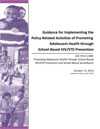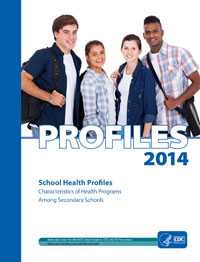School Health Policy
CDC defines “policy” as a law, regulation, procedure, administrative action, incentive, or voluntary practice of governments and other institutions. Policies — including laws, mandates, regulations, standards, resolutions, and guidelines—provide a foundation for school district practices and procedures. Sound school health policies
- Inform, support, and direct individuals throughout the school system
- Reassure families, students, and school staff that safety and health protection measures are in place
- Provide legal protection for schools
- Help contain or prevent controversy
CDC and its funded partners provide information, tools, and resources to support school health policy and program development, implementation, and evaluation.
School Health Policy Information by Topic
Policy Guidance

- Guidance for Implementing the Policy‐Related Activities of Promoting Adolescent Health through School‐Based HIV/STD Prevention (LEA version) [PDF – 511K]
- Guidance for Implementing the Policy-Related Activities of Promoting Adolescent Health through School-Based HIV/STD Prevention (SEA version) [PDF – 1M]
- Anti-Lobbying Restrictions for CDC Grantees (July 2012)
General Health Resources
HIV, STDs & Teen Pregnancy
Every Student Succeeds Act (ESSA)
The Every Student Succeeds Act (ESSA) is the nation’s education law that governs many educational activities for all students in the United States. The law requires states to help ensure that all students have access to excellent teachers and positive, safe learning environments with necessary supports to prepare students for success. Learn more from the U.S. Department of Education.
General School Health Policy Resources
State-Level School Health Policies Database
Searchable database from the National Association of State Boards of Education (NASBE) allows users to search state education laws and practices on issues such as school health curriculum and instruction, staff education requirements, and crisis management and emergency response. The database also provides access to federal laws.
The School Health Profiles (Profiles) is a system of surveys assessing school health policies and practices in states, large urban school districts, and territories. These data can help education and health officials identify professional development needs, plan and monitor program success, support health-related polices, and other activities.
- Page last reviewed: March 21, 2017
- Page last updated: March 21, 2017
- Content source:


 ShareCompartir
ShareCompartir
